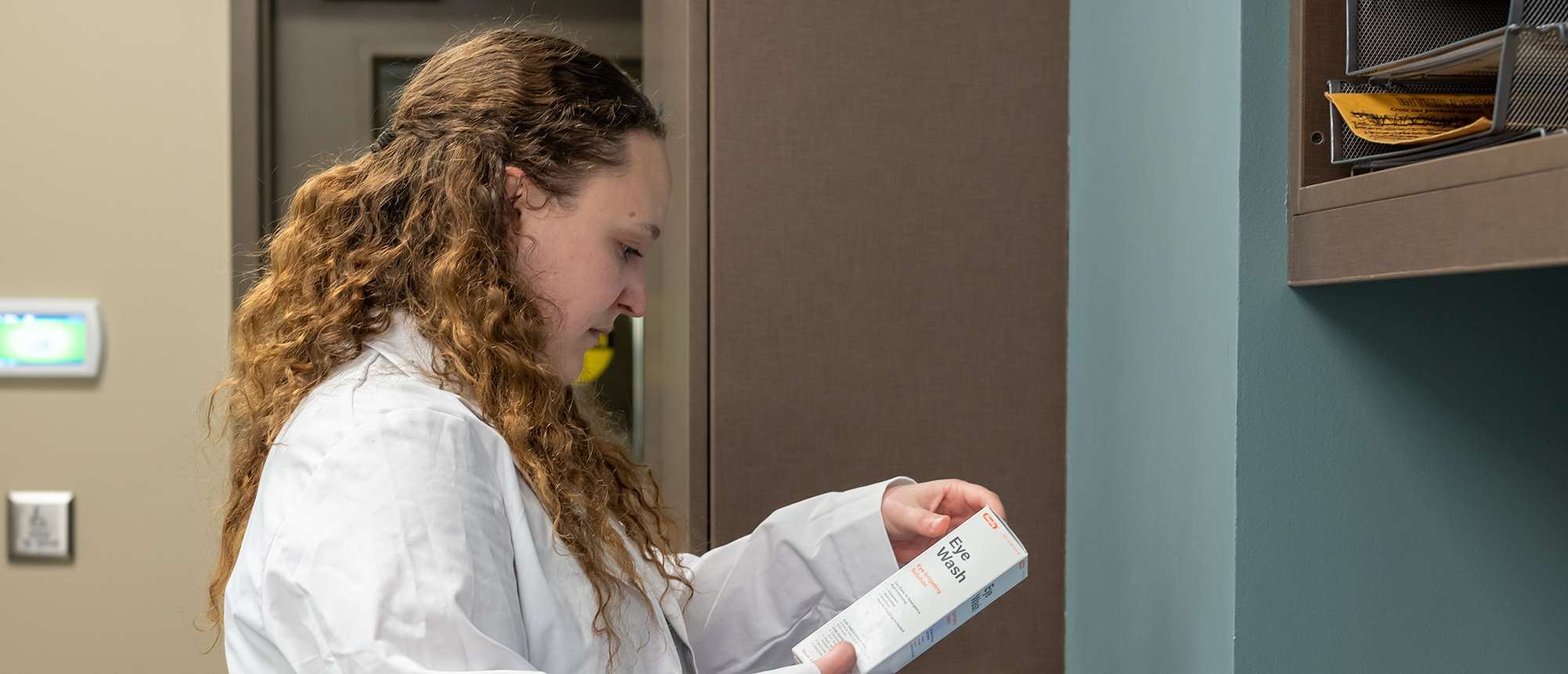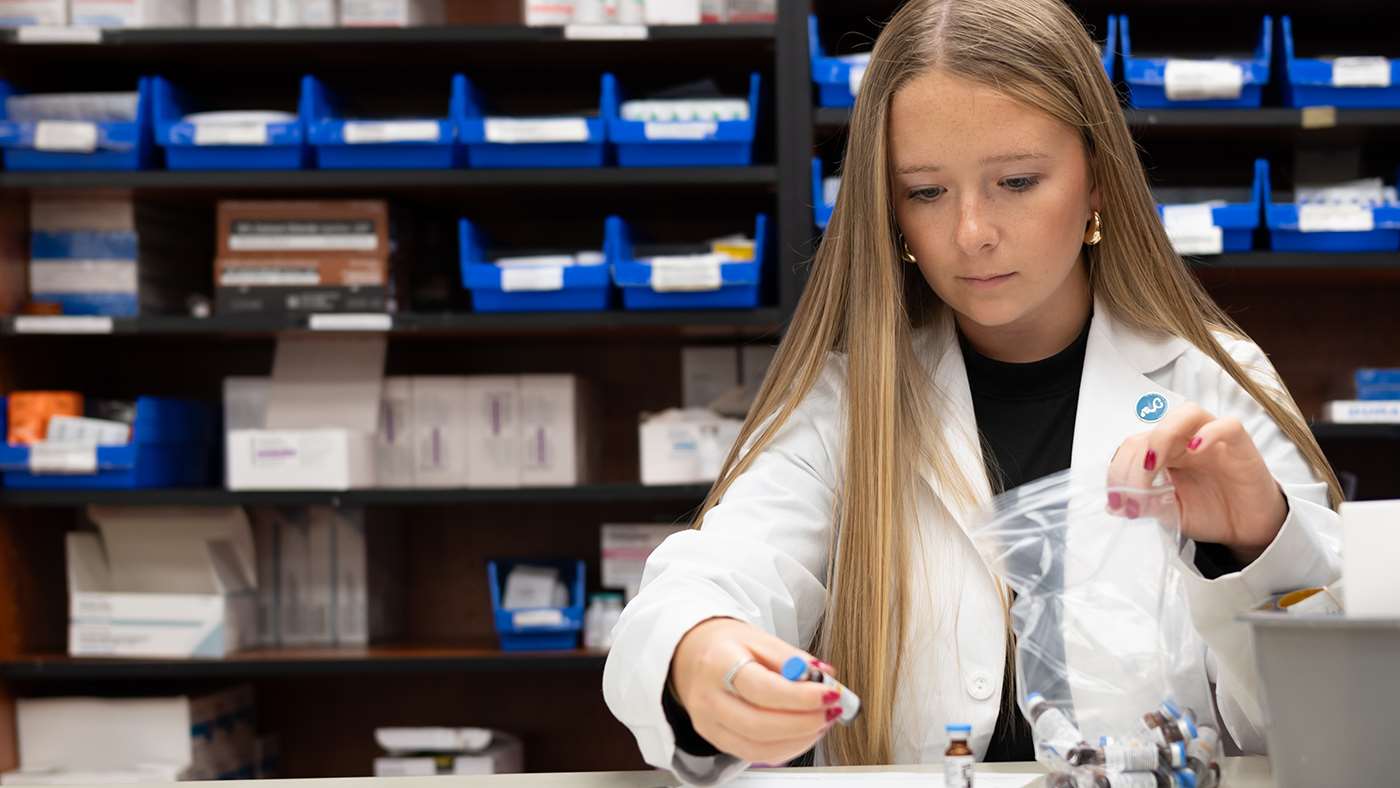New Rural Clinical Rotation Option

Jennifer Erickson, 2025 PharmD candidate, verifies prescriptions at Stoughton Hospital.
Doctor of Pharmacy (PharmD) students at the Medical College of Wisconsin now have a new opportunity to build their professional networks and gain experience working in practice sites beyond the Milwaukee area. In fall 2024, the MCW School of Pharmacy launched the Advanced Pharmacy Practice Experience (APPE) Rural Health Track, which enables pharmacy students during the third (and final) year of the curriculum to complete all seven of their six-week APPE rotations at rural sites in central or northeast Wisconsin.
The MCW School of Pharmacy’s Office of Experiential Education (OEE) meets individually with each pharmacy student several times throughout the three-year PharmD program. Faculty and staff dedicate time to understanding each student’s personal career goals and how those goals may evolve as students gain experience working in different practice settings during weekly clinical rotations in their first two years of the program.
“What we offer students as far as individual attention during the clinical rotation selection process is unique. In many other pharmacy schools, students are required to find their own rotation sites,” explains Stacy Reid, PharmD, BCPS, MCW assistant dean of experiential education and assistant professor. “Our students really appreciate that the OEE team recommends rotations in specialties that align with their interests, and even some opportunities they’ve never considered because they weren’t aware of the career path.”
The MCW School of Pharmacy has a network of more than 500 preceptors who train and mentor students at various practice sites across Wisconsin.
Students can propose their own preferred practice sites, and if there is no existing relationship with MCW, the OEE team will work to create a new affiliation for clinical rotations. This is what the team did for Jennifer Erickson, a 2025 PharmD candidate who completed her undergraduate degree at the University of Wisconsin-Madison and hopes to return to the area when she becomes a licensed pharmacist.
Originally from Manitowoc, Wisconsin, Erickson developed a desire to help patients who experience gaps in healthcare – whether it be an issue of access or of hesitancy. For example, she mentions farmers who are less likely to seek care.
As part of the APPE rural track, Erickson has completed a clinical rotation at Stoughton Hospital, a 35-bed critical access hospital just southeast of Madison. She values the sense of community that exists in the smaller hospital setting.
“We’ve had patients say that their family members recommended Stoughton Hospital because the pharmacist and doctor will listen to you,” recalls Erickson. “That’s what the rural clinical rotation track really means to me – providing patients a place where they can feel safe with their care.”
Madelyn Heikkila, a 2025 PharmD candidate, is pursuing the APPE rural track in northeastern Wisconsin. She grew up in De Pere, Wisconsin, and is participating in MCW’s Undergraduate Dual-Degree Program, which allows her to earn her bachelor’s degree from St. Norbert College and her PharmD degree from MCW in a total of six years.

Madelyn Heikkila, 2025 PharmD candidate, verifies prescriptions during clinical rotations at ThedaCare Regional Medical Center in Appleton.
“I really appreciate the accelerated pathway because I wanted to be able to get into the workforce sooner,” says Heikkila. “The dual-degree program allowed me to cut down on two years of schooling compared to my peers, who traditionally spend four years in undergrad and four years in pharmacy school.”
Heikkila worked as a pharmacy technician at Walgreens when she attended St. Norbert and enjoyed assisting patients with accessing medications or picking out the best over-the-counter options. During an APPE rural rotation at Network Health (an insurance company in Menasha, Wisconsin, owned by Froedtert Health), she experienced a new avenue to help patients.
“During my comprehensive medication review phone calls, some patients would express cost concerns. I would talk with them about patient assistance programs that many manufacturers offer and mail them the application – and they would end up getting the medication at no cost,” recalls Heikkila. “That was a great feeling knowing I was able to provide that supportive care to the patient so they can access the medication that’s going to improve their health without worrying about cost.”
The rural APPE program utilizes MCW’s Green Bay, Wisconsin, location, which is part of the St. Norbert campus. Heikkila returns to her alma mater on the last Friday of each six-week rotation block and participates in a virtual seminar with her classmates who are on MCW’s Milwaukee campus. This conference call allows Heikkila to avoid commuting while still participating in required courses to prepare for the Multistate Pharmacy Jurisprudence Exam and the North American Pharmacist Licensure Exam.
Another perk of the APPE rural track is that students can save money on rent during the final year of pharmacy school by living with their families in their respective hometowns, as Heikkila is doing. The main benefit, however, is building professional networks at those locales. “If pharmacy students know they want to work in a specific area or pursue residency there, this program allows them to make vital connections while they’re still in school. Every rotation is akin to a six-week job interview,” Dr. Reid often reminds students.
Dr. George MacKinnon installed as chair of the AACP Council of Deans
 George E. MacKinnon III, PhD, DMSc (Hon.), MS, RPh, founding dean of the MCW School of Pharmacy, was installed as chair of the American Association of Colleges of Pharmacy (AACP) Council of Deans (COD) in July 2024 after serving for a year as chair-elect. Dr. MacKinnon will serve concurrently on the COD and the AACP board of directors through 2026.
George E. MacKinnon III, PhD, DMSc (Hon.), MS, RPh, founding dean of the MCW School of Pharmacy, was installed as chair of the American Association of Colleges of Pharmacy (AACP) Council of Deans (COD) in July 2024 after serving for a year as chair-elect. Dr. MacKinnon will serve concurrently on the COD and the AACP board of directors through 2026.
The COD’s mission is to identify and address major issues related to the conduct of professional, post-professional and graduate education, research and service in pharmacy and the pharmaceutical sciences. As chair, Dr. MacKinnon has appointed 62 COD members to various committees and taskforces for the council for the 2024-2025 year.
AACP works to enhance the quality of pharmacy education, representing 142 accredited schools of pharmacy and more than 6,400 faculty.
– Melissa Behling



